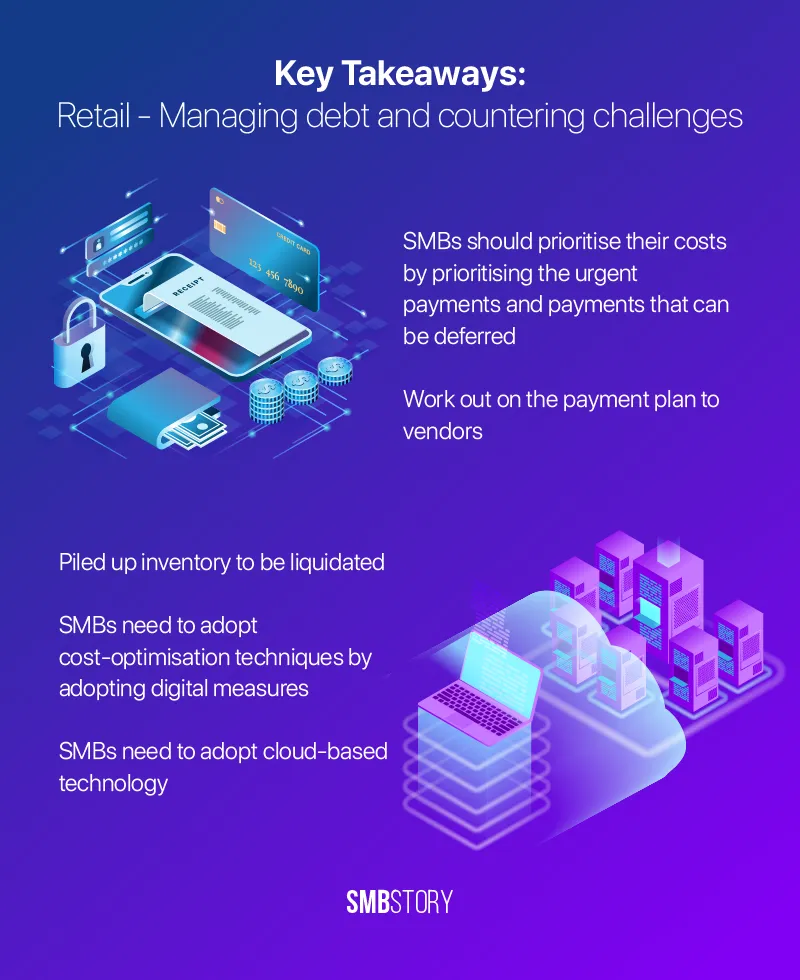YourStory SMB Week: Retail sector experts voice measures to manage debt, counter challenges amid during uncertain times
Amidst the nationwide, the retail sector has been the worst hit. YourStory’s SMB week, powered by Amazon Web Services saw industry leaders come together on a WhatsApp chat to discuss how to manage debt and the challenges COVID-19 has imposed on their businesses
On April 14, 2020, Prime Minister Narendra Modi announced a second phase to the nationwide lockdown in a continuing effort to contain the spread of coronavirus. The lockdown which was initially imposed on March 24, was supposed to be lifted on April 15. However, with an increase in the number of infections , it was extended to May 3, which has spiked fear amongst especially in the retail sector.
With shops shut and e-commerce grinding to a halt, the retail sector is struggling to stay afloat whilst managing their debts, running costs, inventory, and most importantly, their client base.
To help these enterprises power through these difficult circumstances, YourStory started “SMB week - Converse, Combat, Conquer”, a special, first-of-its-kind WhatsApp chat series, powered by Amazon Web Services (AWS). The chat series, which started on April 13, 2020, will go on till April 18, 2020.
On the second day of the series, leaders from the retail sector came together to lend a guiding hand and provide guidance to retailers on how they can navigate these difficult times.

Prioritising the cash flow and cost-saving measures
The foremost challenge for the retail sector is to manage cash flow in the business. But with sales at an all-time low, prioritising expenses has become the need of the hour.
Deepak Bansal, Director, Cantabil says that regularly analysing cash flow and maintaining a fine balance by prioritising urgent payments over payments that can be deferred is essential at this time. This will help in managing the cash flows.
“Retailers can start talking to clients and vendors regarding the payments highlighting the ongoing scenario. For large vendors, with whom they have been doing the business for years, request postponing payments by a month or two. Vendors who are in absolute need of money should be paid first. Retailers can use this opportunity and develop a deeper relationship with the vendors,” says Ankit Rungta, Founder and Director, Story @Home.
For retail businesses that are primarily brick-and-mortar led, a situation like this means a freeze in cash in-flows. The core focus has to be to manage the cash reserves. Umar Akhter, Founder and CEO, says that retailers need to stop all non-essential payouts.
Umar also suggested redeploying some staff to other essential services companies on a temporary basis. This would help better manage salaries and the cash deployed in the business.
Retailers must also differentiate a category of vendor they need to remain operational as 'critical to business operations' . Additionally, all investments of a capital nature and long-term returns should be deferred, says Madhusudan Chauhan, Director, .
Inventory management is another big problem for retailers as warehouses are stocked up and there are no clear sales happening. Retailers across the country are worried, especially seasonal retailers who do not see capitalisation of their inventory in the near future.
The expert retailers addressed this concern in the WhatsApp chat series and advised the option to liquidate the inventory to the vendors and even to the competitor business.
Ankit says, “Now is the time to collaborate and not compete. Talking to competitors for liquidation and working out a payment plan can help ease cash flows for retailers.”
Even fixed expenses like land rentals, salaries, and marketing costs are making retailers worried. To save on rental during the lockdown, retailers can invoke a force majeure clause of the agreement, suggested Deepak.
Technology adoption in the SMBs: need of the hour
Actionable insights that are achieved through technology adoption in the business is the fuel for the growth. Corroborating this statement, retail experts say that technology adoption has enabled them to track real-time sales, manage supply-chain, minimise inventory cost, capture client details, and more, enabling them to scale up.
“The retailers in the SMB segment must be able to articulate their tech needs. Having a solution that fits an SMB retail business model with a clear cost/value proposition is important,” says Umar.
Cloud-based technology- new normal for SMBs
With the nationwide lockdown, most businesses have incorporated social distancing at large. Virtual meetings, webinars, and employee engagement programmes are in full swing. Hence, the cloud-based technology is showing how the business is run at a time when people are sitting far away from each other.
“Indian businesses were already on the road to mass technology adoption to improve the bottom line, but this crisis has accelerated that process. Every business seminar or event that we were attending last year was talking about innovative technology products to improve efficiencies at all levels, there was a big wave of industry 4.0 for the last two years,” says Ankit.
Everything that business owners were thinking they will implement slowly and gradually over the next five years has now become a priority. Adopting cloud-based technology would also be triggered by the fact that it has no capex requirement and the business is in line with the latest technology in the market. For products like CRM, HR and payroll management fraud prevention, simple cloud-based technologies can be used on a monthly subscription basis, thus avoiding huge capex and time needed for deployment of these, he adds.
With connectivity improving in India, cloud technologies would increasingly become the norm, says Madhusudan.
How AWS and its partner can enable digital transformation at scale and support SMBs
At first, it helps in their evaluation of use-cases that enable the digital transformation among the SMBs. The evaluation could be for product launches, digital platforms for a new market strategy, to improve internal efficiencies or to get insights from data using analytics, AI & ML capabilities. It enables SMBs to quickly execute POCs using services from AWS and helping them successfully execute projects by working along with our partner ecosystem.
AWS can help its customers in their journey of digital transformation, understand their use-cases, business problems, skill sets and start working backwards. AWS provides a prospective on cloud adoption framework.
The AWS Cloud Adoption Framework (AWS CAF) helps organisations understand how cloud adoption transforms the way they work, and it provides structure to identify and address gaps in skills and processes. After applying the AWS CAF, SMBs end up with an actionable work plan with defined work streams that can guide the organisation's path to cloud adoption. AWS has the biggest ecosystem of partners with a wide variety of skill sets and products on AWS marketplace.
Amazon Web Services (AWS) provides trusted, cloud-based solutions to meet the business needs of small and medium sized companies around the world. Whether you are running applications that share photos or you’re supporting the critical operations of your business, the AWS cloud provides rapid access to scalable, secure and low cost IT resources. For starting your digital journey you can reach out to us at https://aws.amazon.com/contact-us/

Key takeaways







